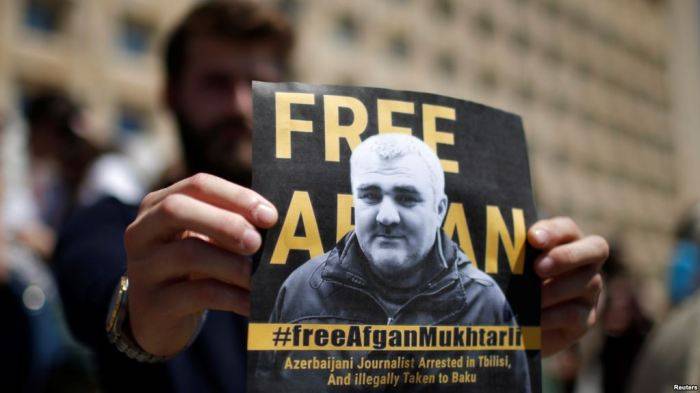საერთო ცხელი ხაზი +995 577 07 05 63


Almost 9 months have passed since the investigation started in the abduction case of the Azerbaijani journalist and activist Afgan Mukhtarli from the territory of Georgia. Regardless high public interest to this case, information about the progress of the investigation is unknown. Alleged participation of Georgian law enforcement bodies in the organized crime and in general, the political loyalty of Georgian Government towards Azerbaijani authority in the cases of Azerbaijani dissidents still is a matter of concern. Furthermore, miscarriages identified in the process of investigation significantly reduce public trust and expectations towards the effectiveness of the investigation. Having that, considering high political and social value of the case, the under-signatory organizations call on the Parliament of Georgia to establish the temporary investigative commission and ensure effective parliamentary control over the Afgan Mukhtarli’s case. At the same time, we urge the Chief Prosecutor’s Office to engage international investigators/experts in the process of investigation and ensure high accountability and transparency in the process.
Regardless high public interest towards Afgan Mukhtarli’s case, the process analysis shows that it is going through significant violations that undermine independence and effectiveness of the investigation.
The MIA collected core evidence, including the video-recordings, through significant procedural violations. According to our information, the investigation did not withdraw video-recordings from the cameras of private companies, which are located alongside the motorway from Tbilisi to Lagodekhi. As for the cameras of the Ministry of Internal Affairs, the witness stated the cameras were off. According to the case materials, the cameras did not function at the border-immigration office “Tsodna” (Lagodekhi) either. Failure of the MIA to obtain essential and direct evidence of the alleged crime reinforces doubts about objectivity and effectiveness of the investigation.
Furthermore, explanations provided to the Organized Crime and Corruption Reporting Project (OCCRP) and to the journalists of the TV-Company Rustavi 2, which independently investigated the abduction of Afgan Mukhtarli raises doubts that allegedly the MIA officers erased the video-recordings from the private cameras.[1]
The public statement of the Minister of Interior about Afgan Mukhtarli’s case reinforced the assumption about the ineffectiveness of the investigation, as he repeated the official version of the Azerbaijani authority and denied political persecution of Afgan Mukhtarli from the side of the Azerbaijani authority.
All in all, the miscarriages identified in the initial stage of the investigation and infringed standards of institutional independence of the investigation, significantly reduced the possibility to estimate the truth in the case and continue the effective investigation in it.
The interview of the deputy chairperson of the Human Rights Parliamentary Committee of Azerbaijan Elman Nasirov to the Radio Liberty on June 9, 2017 reinforces these assumptions; she stated that Afgan Mukhtarli was arrested as a result of joint effort of Azerbaijani and Georgian special services (later she denied her statement).
Self-critical statement of the Georgian Prime Minister about the case and the decision of the Minister of Internal Affairs of Georgia to dismiss heads of the border and counter-intelligence departments, shall not be evaluated as enough reaction from the authority.
Assessments of international organizations were extremely critical of Afgan Mukhtarli’s case and called on the Government of Georgia to ensure timely and effective investigation. On June 3, 2017 the US State Department expressed concern about the fact and called on Georgia to ensure full, transparent and timely investigation. The June 15, 2017 resolution of the European Parliament also stresses out the importance of transparent investigation. On January 12, 2018 the US State Department stated that they continue to closely follow the Georgian investigation into the reported abduction, and reiterate their call that it be full, transparent, and timely. All these statements indicate that it is inadmissible to leave questions and doubts about the case unaddressed. The dragged out investigation seriously harms the human rights state in Georgia and international reputation of the country.
Regardless the request of local and international communities to ensure the effective investigation into Afgan Mukhtarli’s case, the investigation is still ineffective. Consequently, due to particular political and social importance of the case, the under-signatory organizations call on the Parliament of Georgia to establish temporary investigative commission in accordance to the Parliament of Georgia and the Rules of Procedures of the Parliament[3] about Afgan Mukhtarli’s case and to ensure parliamentary hearing of the Minister of Interior and other responsible public officials, including chief prosecutor about the case.
In line with the abovementioned circumstances, the under-signatory organizations call on the Chief Prosecutor of Georgia:
*“Human Rights House Tbilisi” and its member organization “Article 42 of the Constitution” represents interests of Afgan Mukhtarli on the national level and also before the European Court of Human Rights.
Signatory organizations:
Human Rights Education and Monitoring Center (EMC)
Article 42 of the Constitution
Georgian Young Lawyers’ Association (GYLA)
Human Rights House Tbilisi
Human Rights Center
Media Development Fund (MDF)
Georgian Democracy Initiative (GDI)
Tolerance and Diversity Institute (TDI)
Open Society Georgia Foundation (OSGF)
Transparency International –Georgia
Caucasian Institute of Peace, Democracy and Development
Institute for Development of Freedom of Information (IDFI)
International Society for Free Elections and Democracy (ISFED)
Georgian Reforms Association (GRASS)
Civil Development Agency (CiDA)
Partnership for Human Rights (PHR)
Rehabilitation Initiative for Vulnerable Groups
Georgian Charter of Journalistic Ethics
Safari
Georgian Center for Psycho-Social and Medical Rehabilitation of Torture Victims (GCRT)
Network of Information Centers
Georgian Business Media Association
Constitutional Research Center
Governance Monitoring Center
Media Institute
Institute of Democracy and Safe Development (IDSD)
TV Pirveli
Liberali
Monitor
JAMnews
Media Club
Netgazeti
Batumelebi
Rustavi 2
Tabula
OC Media
On.ge
The website accessibility instruction